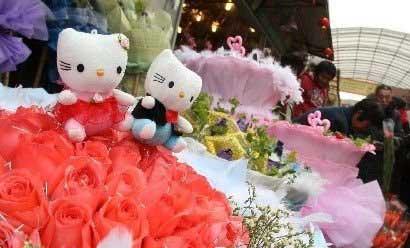Spring Festival coincides with Valentine's Day, a dilemma for love-birds
2010-02-13 20:27 BJTSpecial Report: 2010 Spring Festival |
by Xinhua writer Wang Ruoyao
NANJING, Feb. 13 (Xinhua) -- As Chinese New Year, or Spring Festival, coincides with Valentine's Day on Feb. 14, many young Chinese have struggled to choose between their family and their lover.
"In light of Chinese traditions, I should make my way back home and savor the moment of family reunion on the first day of the Lunar Year of the Tiger," said 27-year-old Chen Xin, a business analyst in Jinan, capital of eastern Shandong Province.
 |
| As Chinese New Year, or Spring Festival, coincides with Valentine's Day on Feb. 14, many young Chinese have struggled to choose between their family and their lover. |
"But it will be a great pity if I spend Valentine's Day without my girlfriend," Chen said, adding that the couple's hometowns were about 200 km away from each other in north China's Hebei Province.
Zi Jia, a 25-year-old postgraduate from Beijing-based Renmin University of China, also felt unhappy about spending the romantic day alone.
"I know for sure that my boyfriend and I can't be together on that day, because his parents want him home in Wuhan (capital of central Hubei Province), and I will be in Jinan," Zi said.
Many Chinese youth would have faced the same dilemma. China's so called "floating" population hit 180 million at the end of 2009, about 150 million of which were migrant workers, said Ma Jiantang, head of the National Bureau of Statistics earlier last month.
The coinciding of the two festivals is a kind of culture clash, and it would understandably present young Chinese, who have been greatly exposed to western culture, with a hard choice, said Li Hao, vice-secretary of the Shangdong Folklore Society.
Despite all the reluctance, most young Chinese still put Spring Festival ahead of Valentine's Day.
According to an online poll conducted by Sina.com and MSN from Jan. 29 to Feb. 8, 59 percent of about 1,500,000 voters said they would be with their family on Feb. 14 while 29 percent of them planned to be with their lover.
"You see how important Spring Festival is to Chinese just by taking a glimpse at the crowds at the railway stations," Chen said. "Spring Festival to us is what Christmas is to westerners."
"As long as a couple love each other, they could spend everyday like it was Valentine's Day," said A Lang, a 24-year-old barber in Nanjing, capital of eastern Jiangsu Province, whose hometown was in rural Huaihua of central Hunan Province.
A Lang regarded spending the Spring Festival with his family as something he must do each year.
But he has promised to make it up to his girlfriend by taking her to a lantern show after the Spring Festival.
Valentine's Day is set on Feb. 14 on the solar calendar, whereas Chinese New Year falls on the first day of the Chinese lunar calendar.
The date of Chinese New Year on the solar calendar changes every year. The two festivals coincided three times last century, in 1915, 1934 and 1953. The next time will be in 2048.
(Reporting by Xinhua correspondents Zhang Zhanpeng in Nanjing and Liu Baosen in Jinan)
Editor: Liu Fang | Source: Xinhua
 Mail
Mail Share
Share Print
Print


 Video
Video









 2009 China Central Television. All Rights Reserved
2009 China Central Television. All Rights Reserved